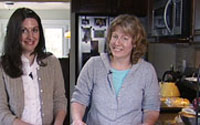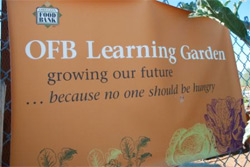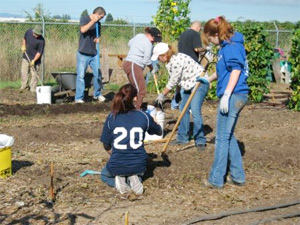I (Lisa Bell again this week!) am very excited to be participating two wonderful programs offered by The Oregon Food Bank this summer. I’ll be volunteering as a mentor for the Cultivating Community program, and then, a bit later, helping out however I can in teaching or developing classes for the Cooking from the Garden class, offered jointly by the Learning Garden and OFB’s Nutrition Education program.
Nicole and I taught this class together a few year back, and it was a truly eye-opening experience. A large contingent of our class was comprised of Eritrean (Northeast African) immigrant families from a low income housing complex with a large garden in North Portland. What was really interesting was that these women could cook, I mean really cook—they could bone a whole chicken in a minute, and cooked complex dishes at home. What they wanted to know was how to cook the “American” food in high demand by their children. Sadly, teenagers had already become accustomed to our food culture of macaroni and cheese, burgers, fried chicken, pizza and soda. Nicole went to visit some of the women for dinner—a wonderful meal of homemade flatbread topped with various vegetarian dishes. Maintaining food traditions and the know-how to grow and prepare nutritious foods can be a real struggle for second generation immigrants, so in a movement to go beyond teaching basic nutrition and cooking skills, the Food Bank is working on new ways to share and preserve cultural food traditions.
Last week, I rambled on about my idyllic childhood spent in the garden, but for most children and teens, that is simply not the norm. Most live in urban areas with little access to open land and have not had the type of lives in which there was ever really much of an opportunity to be outside in nature, much less growing anything. The world of dirt and bugs and vegetables is pretty much as alien to them as a moonscape.
The Cultivating Community program provides a structured, strength-based activity for at-risk youth that gives them opportunity to grow food, build self-esteem, and gain valuable skills they can take with them into their adult work lives. The program is now in its third year and currently serves 6 to 8 various groups of 5 to 12 individuals each ranging from 12 to 19 years old. Some groups come weekly, other once a month for about 2 hours per session. The programs run from April through October.
Currently, Cultivating Community groups are helping out in the garden by doing some wheelbarrow work, composting, planting, and harvesting: collards, chives, asparagus and spinach as of last week. Over the course of the summer OFB’s garden will produce tomatoes, hot peppers, chard, collards, green beans, beets, corn, squash and garlic. (Some of the more perishable crops like lettuces are difficult to keep in storage due to variable demand, while root crops like carrots and potatoes are stocked by donation from other sources.) The youth take the harvested produce to the OFB docks to be weighed and discuss how many families it can feed. (Recipient families and individuals are allowed to take as much fresh produce as they wish.) The youth, of course, also sample the produce as they work, and this exposure to fresh food is invaluable.
While the youth may weed or do other chores with the mentors, perhaps even more important than any work that gets done is the opportunity to connect: with nature, with food at the point of origin, and with people who can provide a non-judgmental, supportive environment. The time in the Garden provides a bit of peace in lives that have don’t allow much space to just “be” and also allows the youth to be on the giving end for a change. It may take them a while to feel comfortable and some of the best “mentors” seem to be the Garden’s 3 laying hens. Feeding the chickens is hands down one of the most popular chores!
The Oregon Food Bank Learning Garden also offers a number of other programs to serve the community including:
Dig In! in which individuals and groups of volunteers help tend the Food Bank’s two gardens.
Seeds to Supper which provides best gardening practices workshops for various eligible communities including church groups, homeless adult and youth programs, low income housing, the Loaves and Fishes program and parents of children in Head Start programs. Groups learn how to create healthy soil, planting techniques, pest management, etc. in single day events or a series of workshops.
Plant a Row for the Hungry in which home gardeners plant extra food and then donate the fresh produce to local hunger relief agencies.
For more information on any of these programs, check out Oregon Food Bank website. For further info and to volunteer, contact Rebeca Siplik, Learning Garden Coordinator.

Next week: Nicole will examine the difference between cooking and baking and why she believes every baked good has a Platonic ideal.
Lisa Bell is a freelance producer, writer and editor. She spent the first fifteen years of her working life as a pastry chef, recipe developer, test kitchen director, food stylist and print editor. She has also taught cooking classes, run a small cooking school, and worked as a food scientist. Nicole Rees currently works as a baking scientist. She is also a food writer and cookbook author specializing in baking science. Her most recent book Baking Unplugged, is filled with simple, scratch recipes that require no electric gadgets beyond an oven.


